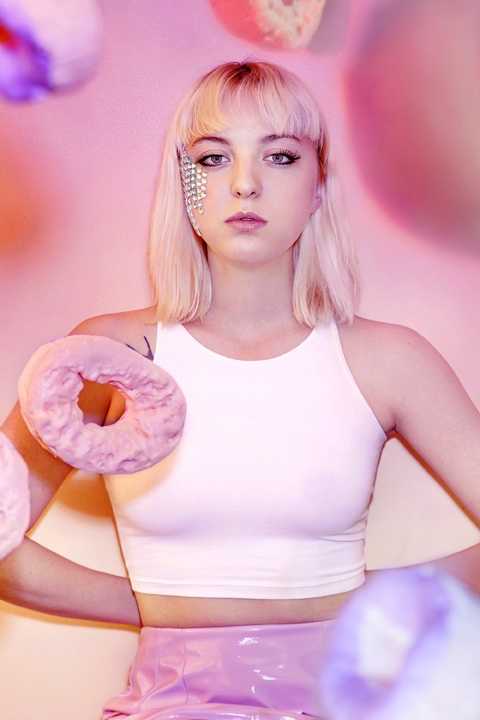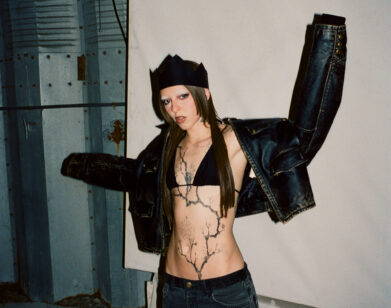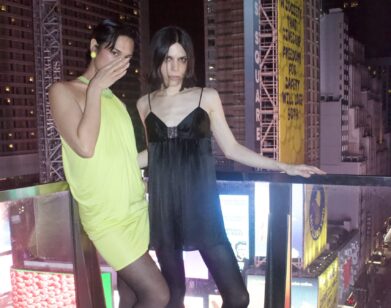Nothing but the Truth

ABOVE: ELIZABETH LOWELL BOLAND, AKA LOWELL. PHOTO COURTESY OF NORMAN WONG
What is there to say about Elizabeth Lowell Boland that has yet to be said? The sprightly 22-year-old pop-punk singer-songwriter has been on the tip of everyone’s tongues, earning the anticipatory praises of Rolling Stone, The New York Times‘ T Magazine, Paper, and more. The hype is well earned, and she’ll be the first to tell you so: “I’m probably one of the best songwriters out there right now,” she says without a hint of irony. With such unapologetic hyperbole—merited or not—it’s perhaps no surprise she cites Mr. Kanye West as one of her musical influences.
Performing under the moniker Lowell, Boland comes out of Toronto, Canada, where she dropped out of university at 18 and began stripping under the name Sara Victoria. Seeing the seedy underbelly of society’s more tabooed arenas lent itself well to much of the autobiographical content of her full-length debut. We Loved Her Dearly, out September 16 via Arts & Crafts, makes for an incessantly honest pop record, boasting irresistible hooks and poetics to match. Through the 12-track L.P., she sings of sex, drugs, and rock-‘n’-roll, but hardly glamorizes it, opting for a more authentic, nearly melancholic portrait of the scene. Openly bisexual, there’s some fun lady-loving innuendo to boot.
Adding to her artistic allure is her case of synesthesia, which forces her senses to blend sight and sound. “For me, G is always blue,” she says. Modern musical greats like the aforementioned West and Pharrell Williams also have the neurological condition, and that’s not to mention legends like Billy Joel and Stevie Wonder. If anything, it just augments the notion that Boland is doing exactly what she’s born to.
Lowell plays Mercury Lounge tonight, September 4, and Glasslands Gallery Friday, September 5. In anticipation of the two New York outings, we chatted with her about the importance of honesty, empathy, and personal growth while finding her footing as a pop artist on the rise.
BENJAMIN LINDSAY: I was curious, just for starters, where the title We Loved Her Dearly came from. It sounds more like a eulogy than a promising debut.
LOWELL: This is supposed to be somewhat of a eulogy. It’s a response to the EP that I just released called I Killed Sara V. The next line in the song “I Killed Sara V.” is “We loved her dearly.” It’s sort of supposed to be a eulogy for someone that I suppose I used to be.
LINDSAY: Yeah, I read in your spot with The New York Times that Sara V. was your performance [stripping] name. Is the whole album an ode to that time in your life?
LOWELL: In a way it’s sort of about that. It’s sort of a diary of what I was going through at the time. Some people think that it’s only about when I was stripping, which it’s not at all—that was just part of it. I think that Sara V. was a name that I created for myself not specifically for that, but it was also just for an alter ego, in a way. [She was] someone that didn’t need to make excuses —”That’s just Sara V.,” you know? Which is funny because at one point, I thought that was a bad thing, like, I was shaming Sara V., which is why I made this E.P. But then moving on, I sort of had a revelation: Sara V. was kind of cool, and that was just me being who I was and society was pressuring me to shame that part of my life.
LINDSAY: It sounds like even though they might be one in the same, “Lowell” is maybe the next step—a step in maturation from “Sara V.”
LOWELL: Yeah, there’s definitely maturation. I was basically 18 when I started that. It doesn’t seem like a difference, but I’m 22, and more importantly, I’ve experienced a lot of things and seen a lot of things. I definitely didn’t blindly make my way through them; I had to make decisions and I had to be really strong in a sort of man’s world.
LINDSAY: You’re only 22 years old, but is there any one experience or particular time in your life that you especially draw inspiration from?
LOWELL: I draw from a lot of things. There’s the stripping, and then there’s also afterwards—trying to make music and people not respecting me. And even just in my childhood. Growing up, I knew a lot of girls who were being sexually abused—I was sexually abused. I realized that a lot of my actions were reflecting that, and when I started to study gender issues, it made me sort of self-reflect and realize that things weren’t necessarily my fault. I draw from that. It was just sort of a realization that my environment had led me to be lost in some sort of way, and I needed to solve that within myself.
LINDSAY: Working on this debut and working as Lowell, do you feel like you’ve found yourself since?
LOWELL: Yeah, I really do. I feel super great in my own skin and I’m really proud of the person I am. But it doesn’t mean that I think I’m, like, “there” by any means. I try to self-reflect everyday. That’s really important for people to do. I’ve still got to learn more and grow more, and I’m sure I’ll still be doing that when I’m 50, 60, and 70. It seems like you get to a certain age and it’s, like, “Okay, I’m done growing! I’m the person I want to be!” But hopefully I’ll stay open-minded to changing, always.
LINDSAY: Yeah, it’s easy to say that. I’m 22 myself, and it’s easy to say, “I’m still finding myself and self-reflecting every day,” but I want to imagine myself when I’m 60 and still doing that. There’s always room for growth.
LOWELL: We definitely hit a point as people where we just feel like we—I don’t know if because we feel like we’ve earned the right to stop changing, but I think that that’s one of the biggest issues with the world: is that the people who have the most power are generally older because they’ve made their way through life and they’re the ones who are successful, but they’re the ones that feel like because they’re in that place, they don’t feel obligated to keep thinking about their actions and to keep thinking about the way the world is and how it’s changing. “I’m done now!” But nope—the world is constantly changing.
LINDSAY: The inability to acknowledge that kind of hinders your sense of empathy with the world; you’re right.
LOWELL: Empathy is a great word. I really feel like, not to sound like a broken record, [but] empathy is literally the most important thing for everyone. That’s one thing that I go back to, because I was in sort of this bizarre world that we look down on. I’m really grateful to have the ability to empathize with anyone.
LINDSAY: Was putting this album out at all an effort to have audiences empathize with you? You’re definitely tapping into some personal veins, it’s sexually charged, it’s a really intimate project. Are you at all wary of letting people into your life in that way?
LOWELL: It’s definitely very naked, which I think is symbolic of the whole project, and sometimes that’s scary, but it’s always so important to me to be honest and open about my past and my life. That was what the project was. It was supposed to be a demonstration of how being honest can actually move people forward.
LINDSAY: Speaking on honesty, you’re an openly bisexual artist. Do you think that has at all affected your experience in the industry?
LOWELL: Especially being a female bisexual, yes, there’s a stigma. I’ve had people say things, like, “Are you sure you’re bisexual, or are you just a slut?” I realized I was bi before I was able to be slutty—not that I have a problem with sluttiness at all, clearly. I would say that that’s all more directly with peers, but I wouldn’t notice it directly related to the music industry. But just being a girl in general, people want to sexualize you, so if you’re bisexual, it’s going to be even worse.
LINDSAY: I feel like We Loved Her Dearly is definitely a pop record in the fact that it can have a wide appeal and it’s obviously taking off pretty well thus far, but how would you describe your music? The things you’re writing about have a very diary-entry-esque quality to them that you won’t find in the standard Top 40.
LOWELL: I think that’s what I’m proud of about this record. I definitely think it’s a juxtaposition; it’s kind of pop, but then, as you said, it’s more honest than pop ever is nowadays. At some point in time, like, in the ’80s—that was a time when pop was somewhat intelligent and I think it just sort of lost itself. I really do think that people will listen to it and not be scared of the subject matter.
CATCH LOWELL AT MERCURY LOUNGE TONIGHT, SEPT. 4 AND GLASSLANDS GALLERY FRIDAY, SEPT. 5. WE LOVED HER DEARLY IS OUT VIA ARTS & CRAFTS SEPT. 16. FOR MORE ON THE ARTIST, VISIT HER FACEBOOK.






